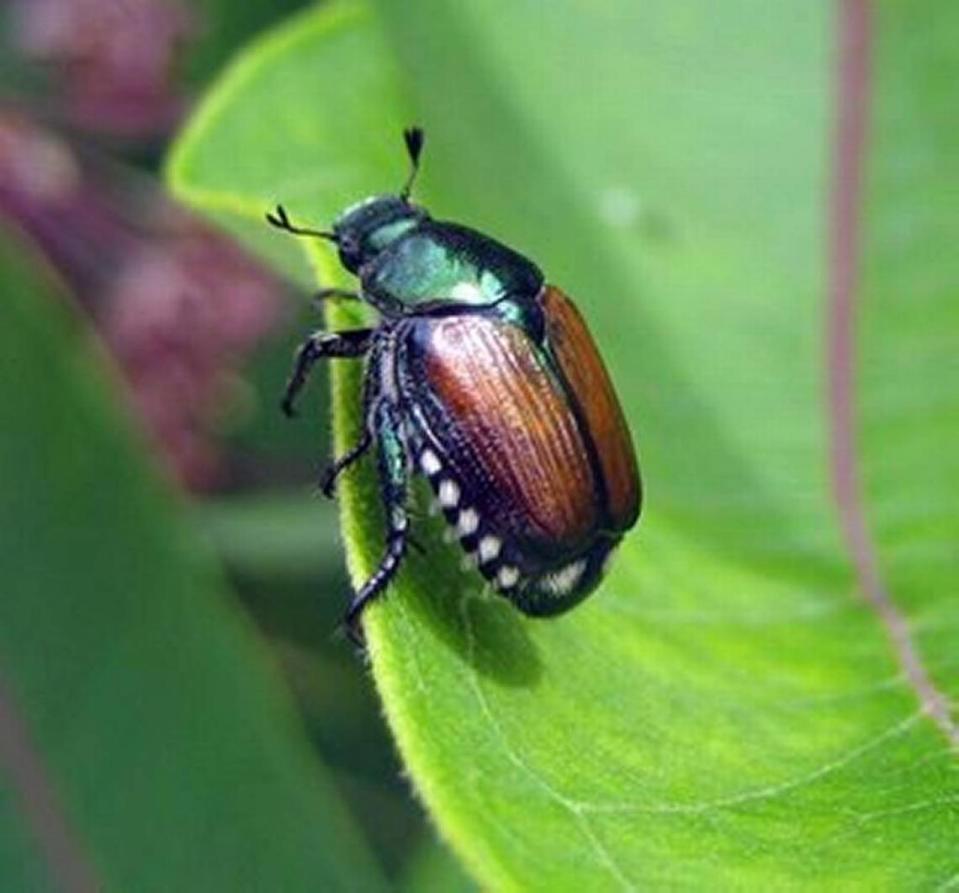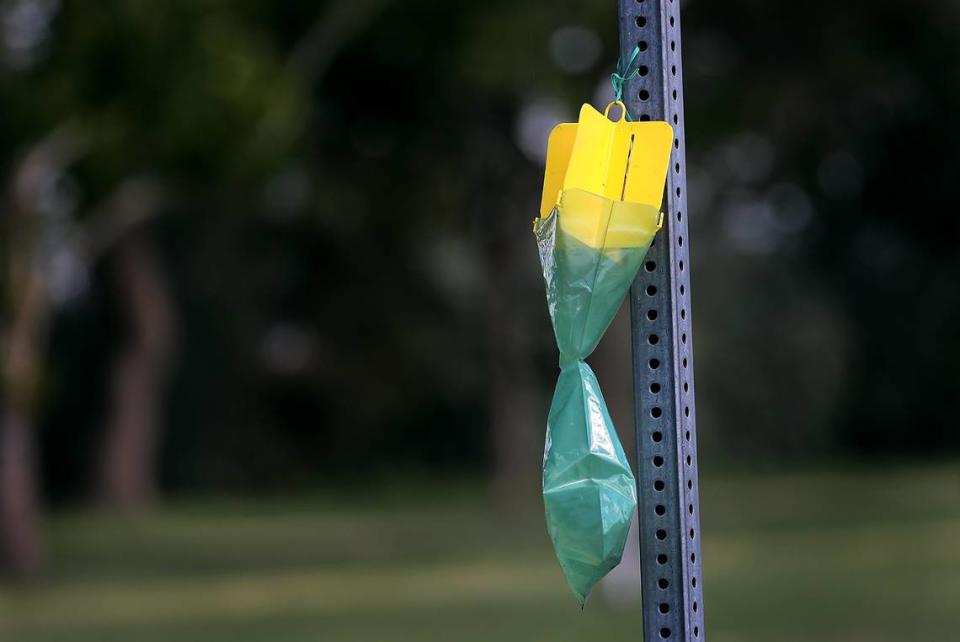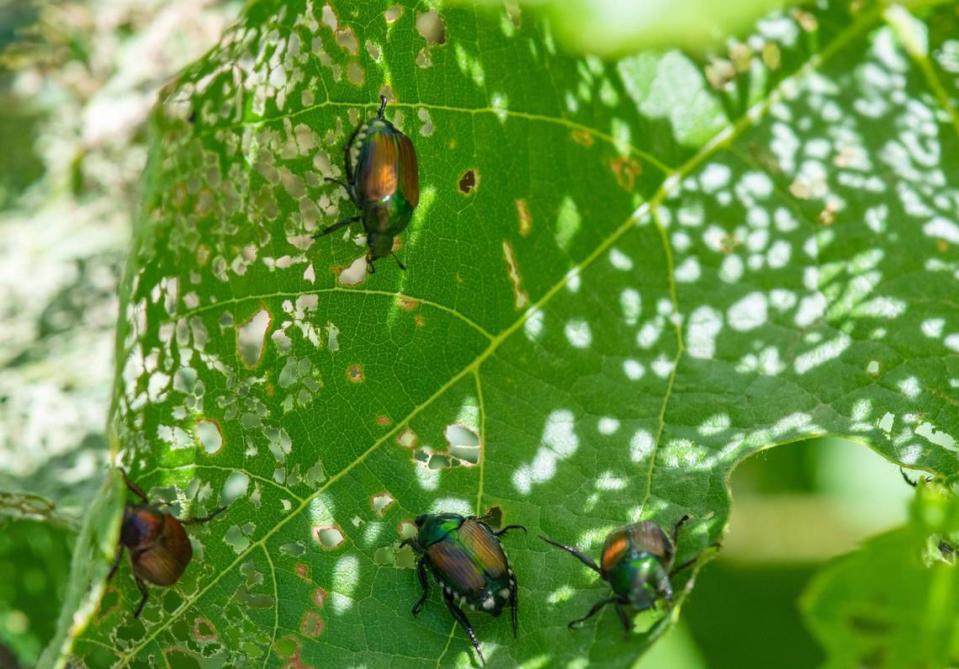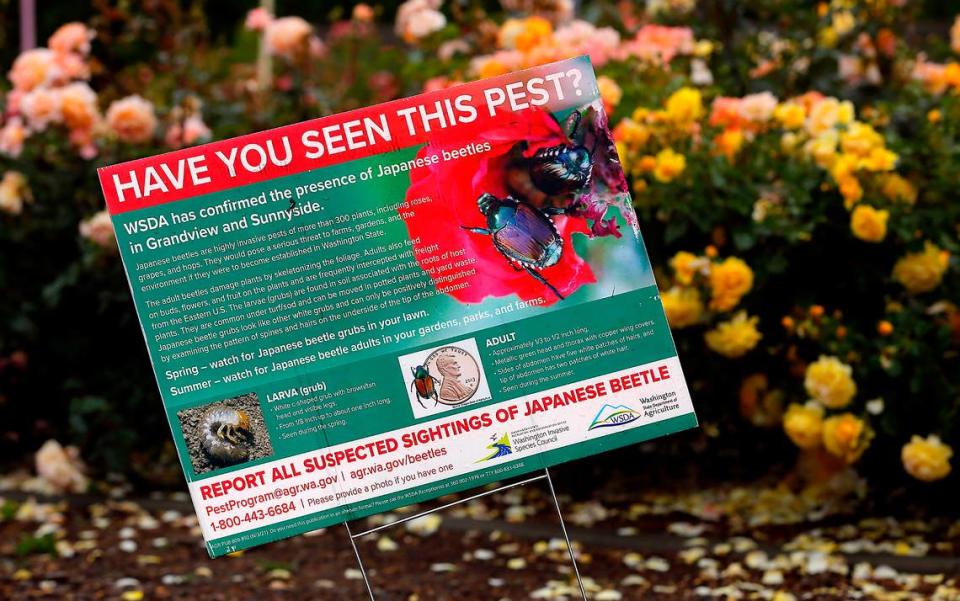More destructive Japanese beetles found in Tri-Cities. Could it lead to a quarantine?
State officials are investigating the possibility that Japanese beetles are living in Pasco after a second and third beetle were found in traps checked this week.
The invasive insect can devastate grape crops, strip roses and other garden plants of their leaves, and damage turf at homes, parks and golf courses.
The first Japanese beetle was found in the Tri-Cities last year in Richland on Truman Avenue near Target. A nursery is nearby and that may be how the beetle was brought into the area.
No other Japanese beetles have been found in Richland.
But in July a Japanese beetle was found in a Franklin County Horticultural Pest Control Board trap near Road 76 about a quarter mile south of Argent Road in Pasco.
The Washington state Department of Agriculture responded by putting out 250 traps and beginning inspections of nurseries in the area for possible signs of Japanese beetles.

When traps were checked on Monday two Japanese beetles were found near Road 34 and Court Street near the U.S. Post Office.
Washington state Department of Agriculture officials are hoping for results similar to what they found in Richland, with no breeding Japanese beetles.
But they “have to start investigating a possibility of a population living in Pasco,” said Camilo Acosta, the Japanese beetle eradication project coordinator for the state Department of Agriculture, speaking to the Franklin County Commission Tuesday by phone.
If more Japanese beetles are found, that will inform the state’s strategy to deal with Japanese beetles as a new season starts in the spring, he said.
Steps to eradicate beetles
“What we want to prevent in Pasco, Richland, Kennewick is proliferation of the problem” to the level seen the Grandview area, Acosta said.
There Washington state is using a quarantine and spraying to reduce the worst infestation in the state, which crosses the Yakima County line into western Benton County.
In 2020 three Japanese beetles were discovered there and the next year more than 24,000 of the beetles were trapped there. So far this year 12,651 Japanese beetles have been trapped, indicating a slight reduction in their numbers after a year of eradication efforts, Acosta said.
The next area where they have proliferated is 30 miles away in Wapato, where they were first detected in 2022. The Yakima Herald reported that after an initial sighting, 186 Japanese beetles were trapped there last year.

The state plans to continue to visit nurseries and set more traps in Pasco. Residents of the Tri-Cities may have seen the traps — green bags topped with yellow — hanging from trees and signs.
What they find will inform a decision on whether action is needed next spring, such as spraying insecticide or a quarantine.
“What we want to prevent in Pasco, Richland, Kennewick is proliferation of the problem” to the level of the Grandview area, Acosta said.
A quarantine area has been established for the Grandview area stretching within a couple miles of Prosser, with the movement of plants, soil and plant waste out of the quarantine area prohibited. that includes cut flowers, bulbs, potted plants, yard and vegetable garden debris, and topsoil.
Those within the quarantine area must take their yard debris to a drop-off yard at 874 Bridgeview Road in Grandview from May to October.
The Department of Agriculture also is fighting the Japanese beetle infestation by offering free treatment of turf grass in the Grandview area, including at homes and parks, in the spring with insecticide that kills larvae in the ground.
About Japanese beetles
The beetles, native to Japan and southeast Asia, are metallic green and brown and have little tufts of white hair on their sides as adults.
They overwinter in lawns or other soil and then emerge in June in the Mid-Columbia to feed on more than 300 ornamental and agriculture plants, turning the plants into skeletons as they consume the foliage, flowers or fruit.

During their grub stage they also can attack grass roots, according to the U.S. Department of Agriculture.
“If Japanese beetles were to become established in Washington, it would pose a serious threat to gardens, parks and farms by destroying vegetation,” according to the state Department of Agriculture.
Farmers could be prohibited from sending agricultural products out of the area.
The state of Oregon has estimated that if Japanese beetles were to become established there, the economic impact to its crops, commodities and other related businesses could be approximately $45.5 million.
Help battle Japanese beetles
A find of Japanese beetles can be reported at bit.ly/ReportBeetlesWA or by email to PestProgram@agr.wa.gov with contact information, the location, date, photographs of the beetles and the number seen.
Or you can call 800-443-6684.

After taking a photo, make sure the beetles are dead before discarding them.
You can learn more by stopping by the booth for the pest control boards of Benton, Franklin and Walla Walla counties at the Benton Franklin Fair next week.
Residents also can help by purchasing traps sold at home and garden stores and using then on their property from spring through fall, according to the state.
The traps allow any beetles caught to be killed and help the state track the infestation.
Adult beetles can hitchhike on vehicles and on items stored outdoors.
When adult beetles are flying from late spring through October, those who live in or visit the quarantine area should take a second to ensure they are not giving a free ride to beetles when they leave the area.
This can be as simple as checking the back of your pickup truck, according to the Department of Agriculture.

